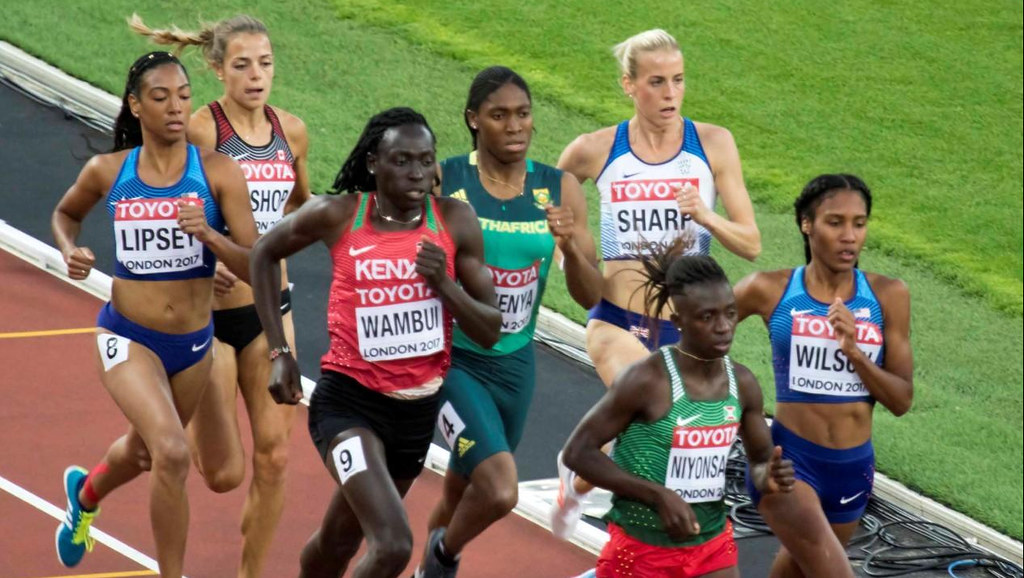Image Credit: Filip Bossuyt from Kortrijk, Belgium; Shared under Creative Commons Attribution 2.0 Generic license CC BY 2.0; Image cropped to 16:9.
New rules to curb high testosterone levels in female athletes with differences of sex development ‘risks setting an unscientific precedent for other cases of genetic advantage’, warn experts including Dr Sheree Bekker from our Department for Health in a BMJ paper released today .
Writing in an editorial, Dr Bekker and Professor Cara Tannenbaum (University of Montreal), argue that the medical profession ‘does not define biological sex or physical function by serum testosterone levels alone’ and they say the regulations ‘challenge the evidence based, benevolent ethos that underlies medical practice.’
The regulations, proposed by the International Association of Athletics Federations (IAAF) in 2018, state that women must have a blood testosterone level of 5 nmol/L or less at all times in order to compete. These are based on the contention that women with high testosterone levels and androgen sensitivity have a performance advantage over their peers. If women are over this level, they are required to lower it with hormone treatment.
The South African runner, Mokgadi Caster Semenya, who won Olympic gold medals in 2012 and 2016 - and was banned from international competitions for almost a year for having testosterone levels above the threshold - is contesting the legality of the new rule based on a lack of scientific evidence that testosterone levels substantially enhance sports performance.
As such, the IAAF has delayed implementation of the regulations until their legality is determined – expected next week, 26 March 2019.
The authors of the new paper argue that blood testosterone levels vary naturally in men and women, with particular overlap among elite track and field athletes.
They also point out that direct – causal - associations between testosterone levels and medal winning cannot be determined, and that proving androgen sensitivity in athletes ‘is also problematic since reproducible, valid laboratory tests to detect androgen sensitivity do not exist.’ The lack of reproducible scientific data on the effect of testosterone on speed during track and field events poses an additional challenge, they say.
‘At their core, the 2018 regulations seek to identify athletes whose lifetime sex assignment as female - and gender identity as a girl or woman - does not match an imposed female serum testosterone level of 5 nmol/L or less,’ write Professor Tannenbaum and Dr Bekker.
‘The effect of these policies on individuals, societies, and even medical science has far reaching implications.’
They continue, ‘[i]f more science is needed to develop an objective measure of androgen sensitivity, then call for health research organisations to deliver on this mandate… In the meantime, complacence around the IAAF 2018 testosterone regulation for women with differences of sex development risks setting an unscientific precedent for other cases of genetic advantage.’
Dr Bekker, Prize Fellow in the University’s Department for Health explains: “This topic is currently in the news because the Court of Arbitration for Sport ruling on the legality of the IAAF eligibility regulations for women with differences of sex development is due on or before the 26 March 2019. This ruling will have ripple effects across the very fabric of sport, in that it is, fundamentally, about athletes’ rights to participation.
“Sports organisations have been grappling with the question of eligibility for years now, however, in reality, the science and the ethics of this issue is quite clear. First, from a scientific and medical standpoint, we know that testosterone is not the only indicator of sports performance. The almost mythical perception of ‘T’ as the elixir of performance is not backed up by science. There are many other factors at play – including training, funding, and access to resources – in the development of a winning athlete.
"This matters because this is about all women’s rights to participate in sport. It is important to understand the unintentional outcomes of regulations such as the one in question, including the ways in which regulations may potentially breach human rights. The Universal Declaration of Player Rights, which deals with the intersection of sport and human rights, reminds that an athlete’s right to participate in sport cannot be limited by their gender - or any other identity-related factor.
“I hope that this editorial prompts both an evidence-based and human rights considered conversation. Athletes should not only be safe, but must feel safe too. We shouldn’t forget that athletes – people – are at the centre of this dialogue.”
- Read Sheree for The Conversation: 'Caster Semenya v IAAF: ruling will have big implications for women's participantion in sport'.

